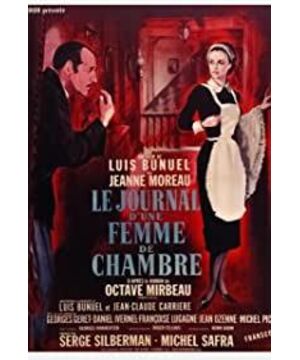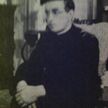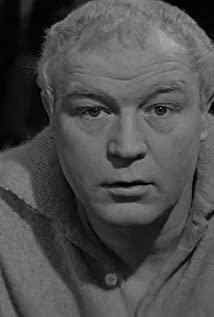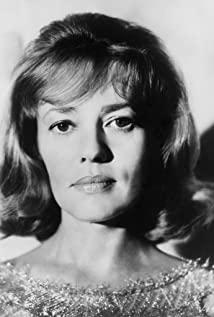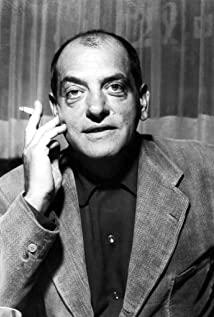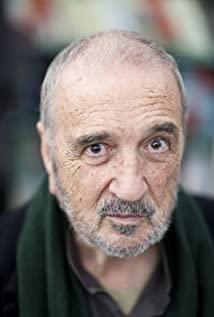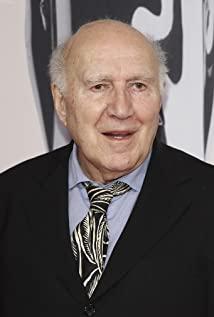Spanish film master Luis Buñuel directed "Angel of Destruction" (also translated as "Angel of Destruction") in Mexico in 1962. For this film, he has always regretted not being able to shoot in Paris or London. Sometimes there is no choice in life, just as he likes winter, but has to live in tropical Mexico for 36 years.
Fortunately, in the following 1963, he returned to Paris to film "The Diary of a Chef", and quite proudly invited the popular Jeanne Moreau to play the heroine. He said that Jeanne Moreau does not need your guidance at all in acting. Her amazing talent is amazing. At that time, it was because he watched "The Elevator to the Gallows" directed by Louis Mahler, and the walking gesture of Jeanne Morrochet in the film deeply attracted him. When she walked, she trembled slightly, showing a certain tension, but she was very stable and very beautiful. It just so happened that his son was working as an assistant to Louis Malle.
In fact, Jeanne Moreau starred in Truffaut's "Jules and Jim" (also translated as "Summer Love") earlier, which detonated the film industry. She was born with a special intellectual temperament, a kind of implicit beauty, both noble and elusive, like a mysterious stunner walking in both good and evil. This is reminiscent of an earlier Hollywood star who played the flirtatious style of Barbara Stanwyck, the heroine in Billy Wilder's "Double Indemnity". This sharp and restrained spiritual aura has infinite charm. It's no wonder that Celestine in "The Chef's Diary" can seduce so many men, and almost all the key characters in the film are more or less involved in such unclear relationships with her. That's why Buñuel chose Jeanne Moreau for the pivotal role of Celestine. Only she has the charm of this soul-sucking, and if you change it, you will lose points.
The story in the film has the doubts and suspense of Fritz Lang's film, but it is by no means a Hitchcock-style thriller and suspense. Bunuel's most revered film master is Fritz Lang. Although the age difference between the two is only eight years old, Bunuel is determined to be engaged in film work for the rest of his life. It is from Fritz Lang "Fate" and other movies. his confidence. Interestingly, the two were not able to meet until 1972. That same year, Bunuel's "The Charm of Bourgeois Discretion" won the Academy Award for Best Foreign Language Film.
That time, he met Hitchcock, John Ford, William Wheeler, Billy Wilder and Stevenson in Los Angeles and other big directors, which can be described as a good story in film history. Because 80-year-old Fritz Lang was inconvenient in his legs and feet, he was unable to go, so he sent someone to invite Buñuel to his home to talk. This made Buñuel, who is also 72 years old, overjoyed, and this was the first and last time the two met. The two masters cherish each other. When parting, Bunuel couldn't hide his excitement, and asked Fritz Lang to find two photos and sign them. Buñuel, who regarded it as a treasure, later recalled that it was really strange that these two photos could not be found later.
After filming "The Chef's Diary", he said, "After accumulating the results of making movies for a long time, I found that the most important thing is to have a good script... Regarding the writing of the script, I think the most important factor is the suspense - that is Said, how to develop an effective plot, you have to make the plot interesting and convincing, so that the audience is not distracted for a moment." Yes, his films have the effect of not being distracted for a moment.
Like "Destroying Angels", the brushstrokes of "The Diary of a Cook" are still alluding to the bourgeoisie and religion. And later "Beauty in the Daytime" (also translated "Brooch House Resentful Woman") intensified the essence of the empty soul of the middle class. It's just that "Destroying Angel" is more violent and bold, reaching a most desperate situation. Let the middle class be like the devil is cursed, everyone is helpless, and they are inexplicably trapped in the big mansion in the dangerous city.
In thirst, terror, and death, they do all they can to intrigue, and sex is one of those pastimes. Infatuation, fetishes, etc., in Bunuel's view, are all manifestations of the self-degeneration of the bourgeoisie. Playing Scarlatti's famous piano piece "Paradise Sonata" can attract the angel of annihilation mentioned in the "Book of Revelation" of the Bible, and make this group of selfish and dirty souls suffer from physical and mental oppression and torture.
The film, as always, presents the nightmares that are only found in Bunuel's films, and interprets their own unease. Even the sheep and bears raised by the owner usually came out one after another, seeming to laugh at this so-called stupid and self-deceiving crowd. Although the later "The Charm of Prudence in the Bourgeoisie Stage" is slightly "gentle", it shows the corrupt and incompetent nature of the bourgeoisie, and the religion that paralyzes people is just useless preaching that poisons people.
Buñuel has always been an atheist. This is related to his living environment since he was a child and getting along with classmates such as Lorca and Dali when he was a student. He came from a wealthy middle-class family and went to church with his family every week to go to Mass, but his films are all anti-bourgeois and anti-religion. His rebellious spirit, when applied to his films, acts as a catalyst. People's words and deeds are closely related to the subconscious, which is a psychological instinct and an extension of natural phenomena. Buñuel's surrealism stems from this. And he always goes to great lengths to deconstruct bourgeoisie, religion and sexuality, colorful and sharp.
In 1961, after more than two decades in exile, the Franco regime finally allowed him to return to his native Spain to film Biridiana. The film could not be released in Spain because of the notorious censorship at the time. His last film, The Obscure Purpose of Desire, was also shot in Spain in 1977. Born in the first year of the century, he died on July 29, 1983, at the age of 83.
Looking back on Buñuel's life, his films are roughly divided into three phases: the surreal phase after his studies in Madrid in 1920. He and his classmate who later became the great poet Lorca had a strong friendship. Buñuel had always dreamed of becoming a poet and had published poems. With his classmates, Dali, who later became a master of Cubism, developed from a friendship to a later partnership. Buñuel has always been obsessed with American jazz, can play the banjo, and likes to watch American comedy movies (somewhat similar to Yasujiro Ozu's childhood hobbies). The experience of living in Paris in 1925 laid the foundation for his surrealism. He often discusses this topic with Aragon, Breton and Éluard among others.
In terms of movies, he saw the influence of Eisenstein's "Battleship Potemkin", Nauru's "The Last Smile", and especially Fritz Lang's "Destiny" and many other films, which prompted Bunuel to truly Aspiration to become a film director. He said, "Fritz Lang's films touched my deepest emotions, purified my life, and broadened my horizons." Later, he became director Epstein's assistant. Although it was very uncomfortable, he still learned a lot. thing. In 1928, he borrowed money from his mother. Thanks to Dali's encouragement, he created the short film "An Andalusian Dog" together based on the extension of the two people's dreams. As soon as it was released, it caused a sensation in the international film circle and became a European pioneer in the 1920s. A masterpiece of surrealism in the film movement. In 1930, he made his first feature film "The Golden Age". Later, "Grainless Land" was also filmed.
Then came the period of exile in Mexico from 1950 to 1960. The experience of exile has made his films more mature and sharper. Surrealism continued to flourish, subtly mixed with the mysterious and poetic Latin American magic. His best films include "The Forgotten People", "Death and Rivers", "Nazarin", "Pao's Volcano" and "Destroyed Angels", etc. During this period, two films were made in Hollywood, one of which was "Robinson Crusoe" and "Young Man". Buñuel is extremely satisfied with both films. During his most difficult times, he inspired his amazing creative energy.
The final stage, when he was able to return to Spain in 1961, was filmed in France for Diary of a Cook, Beauty by Day, Simon in the Desert, The Charm of Bourgeois Discretion, Galaxy and The Obscure Purpose of Desire. This is the most conspicuous stage of his film creation. His films are sharper and more varied. It presents scenes of surrealism and magical poetic aesthetics.
Throughout his films, it is like opening the curtain of the hidden clumps of the human mind, revealing the mysterious undercurrent of the subconscious in psychology, just like the inspiration given to people by Freud's psychoanalytic psychology. I think this is closely related to his tossing and turning experience. This is where he is beyond the ability of ordinary directors. Standing on the highest point of the human soul, it is as thin as a needle, always picking pains and touching the most vulnerable nerves in human nature. In his films, no matter men or women, there is no inner secret at all, just like encountering a cunning hunter, all prey are always stripped to pieces by him. It is no exaggeration to say that Buñuel not only represents the evolution of the last century of film in the world, but is also the most powerful witness and witness in the history of that century of change.
This stern expression reached a peak in his later film "The Phantom of Liberty" (1974). The title of the film is a true portrayal of his life's hard work and his film ideas. The characters in the film seem to be unrelated, but they are inextricably linked. The connections in them seem inexplicable, but in fact, they all reveal the perverseness and inner anxiety of people walking. The id and the superego are mixed together, allowing time and space to interlace, extend and break. Life always has the feeling of being lost in the next moment.
Many images are linked together in the film: a strange man takes pictures of the girl's landscape, reminding the girl's parents of their hometown and resentful. The female doctor drove to visit her sick father, but was blocked by the flood in the hotel. The men, women, and children of all colors gathered in the room and staged a mysterious world. Even the four priests were automatically involved. The professor's classroom has become a place for the police academy students to laugh and scold. The professor's worries about nuclear weapons, population explosion and environmental pollution forced him and his friends to eat in the toilet, but the living room became a decoration. A wealthy man who saw a doctor was diagnosed with liver cancer, but he slapped the doctor. When he got home, he was told that his little daughter was missing. The family rushed to the school class. Report to the police station.
The police officer ordered his subordinates to search for the missing girl based on the appearance of the little girl. At the top of the most modern high-rise building in Paris, a cold-blooded sniper was squatting and attacking from all directions. Passersby fell down one by one. After being captured, the sentence of execution was pronounced. In fact, he was released as a hero, and many people came to him to sign...
This film, which is specially marked as "purely fictional", is bold and cold, detached and melancholy, penetrates the fog of injustice and hypocrisy in reality, and exposes various blind spots of the modern human spirit, making people breathless, like a police officer in the film. The commissioner, recalling the fantasy scene of his deceased sister, playing Brahms Rhapsody topless in a scorching heat. These chaotic personnel affairs are exactly in line with the image of his first film "An Andalusian Dog". It turns out that he has been immersed in the "phantom of freedom" and has always been responsible for "destroying angels", but this kind of "Destroyed" is transformed into the restless and unwilling souls in his shots.
Sometimes, I think that Bunuel's films always stand in the perspective of the general pattern of all mankind in a forward-looking manner, to consider and reveal problems in a detailed manner, rather than being limited to a certain ideological area. Therefore, his analysis of the spiritual level of people from all walks of life has reached the point of complete emptiness, which can be described as an inexhaustible deconstruction.
In the last few years of his life, he basically spent it in daydreaming, nostalgia, and memories. This is not helplessness, but what he has wanted all his life. Buñuel himself has been fond of dreaming and fantasizing all his life, he said, "If life were to give me only 20 years, I would set aside two hours of the day for activities and the remaining 22 hours for dreaming, and I will record the dream." He once said about what surrealism is: "The love of dreaming and the interest in the content of dreams are the most important things all surrealists have in common."
And he has increasingly shown concerns about nuclear threats, population explosions, environmental pollution and food safety. He said, "In any case, I always feel that our age is approaching the brink of another prehistoric age, the devil will finally win the final victory, the power of destruction is approaching step by step, and the human mind has not achieved any clarification or any progress, even Regression. We live in a fragile, fearful and unhealthy time where only kindness and wisdom can save us, but where are they? It seems that the 'accidental' factor is also helpless." The truth is, 30 years after his death Later, these worries of his are becoming an urgent reality, and there is an intensifying trend, which makes people unable to rest for a moment.
In fact, as early as 1932, under difficult circumstances, he shot the sensational documentary "Grainless Land", which was filmed in the 1930s with American Par Lorenz's "The Plough" and other series. , Capra's "Why We Fight", Soviet Michal Rom's "Ordinary Fascism" and Alan Ryren's "Night and Fog", constitute the classic works of reflection documentaries in the world film circle .
He is blunt by nature, always outspoken, and has a lot of criticisms about some artists, so I won't go into details here. I'd rather believe it was his whim than the ultimate assessment. It is about the later French New Wave, he said that apart from Godard's "Out of breath", I don't see anything new in the so-called New Wave. I think if he had seen the Truffaut and Rohmer films in their entirety, I believe his opinion would have changed. But he still likes the films of Desi Ka, Kim Viggo, von Stenbauer and von Strahan, and, of course, his young idol Fritz Lang. The only movie he saw three times in his life was "Notes on Zaragoza", which may have something to do with his nostalgia for his hometown. But his nostalgia for Lorca runs through his life. He clearly remembers the poem Lorca gave him in 1929:
blue sky
yellow field
blue mountains
yellow field
on the open plain
An olive tree is shaking
just one
olive tree
What a beautiful poem. Not only in Spain, but in the whole world there is only one olive tree. And film as an art, so far has allowed Buñuel to play to the extreme. There is no doubt that his more than 30 classic films have become a myth in the international film circle. And his turbulent life makes people believe that a great creator is not trapped by the environment. The more he is tempered in tenacity, the more explosive and creative he is.
2013, 7, 16
Selected from the film critic collection "Invisible Movies" published by Haitian Publishing House (this article is abridged)
View more about Diary of a Chambermaid reviews


